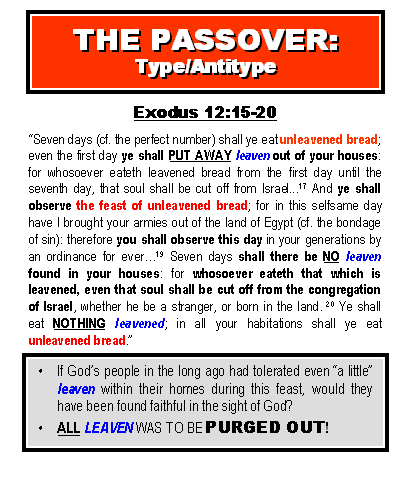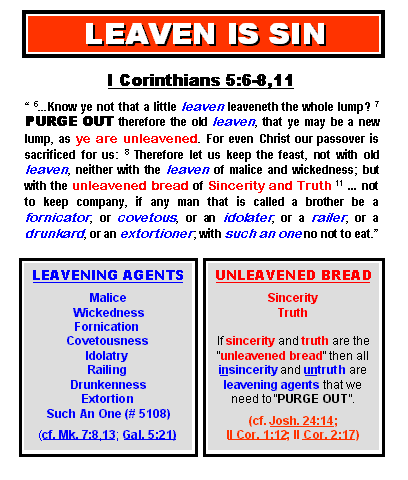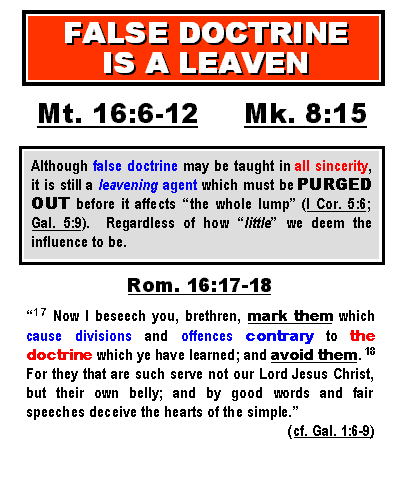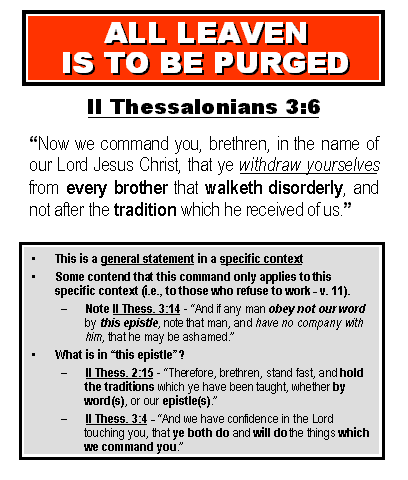FELLOWSHIP
By Jeff Belknap
The following includes a sermon outline (with overheads) and an article on the same subject, dealing with the text of 1 Corinthians 5:6-8, 11. These demonstrate the importance of "purging out" false doctrine from among us if we are to keep the feast with the unleavened bread of sincerity and truth--an attitude which seems to be lacking these days.
Chart #1:

Chart #2:

Chart #3:

Chart #4:

INTRODUCTION: The Passover - Type/Antitype
Please open your Bibles and read Exodus 12:15-20, then note the emphasis made in Chart #1 above...
i. The objective of this lesson is to take a closer look at the Passover, and it’s antitype.
ii. In doing so, I believe that we will dispel three misconceptions that exists among brethren (not among all brethren, but among some).
-
First of all, we’ll find that The Passover is not a type of the Lord’s Supper. Rather, it is a partaking of the gospel (i.e., the bread of life).
-
Second, we’ll learn from the New Testament that all sinfulness in the body of Christ is referred to as leaven (whether in word or deed), which when not repented of, needs to be marked and withdrawn from.
-
The third point I hope to make obvious, is that all false teaching is revealed as a leavening agent that must always be purged out of the church, regardless of whether or not the preacher is deemed sincere
The following discussion will further explain the key points in the charts above...
DISCUSSION:
I. Leaven Is Sin!
Please open your Bibles and read 1 Corinthians 5:6-8, 11, then note the following points as you observe Chart #2...
A. All leaven is to be “purged out.” Paul wrote in I Cor. 5:7, “Purge out therefore the old leaven, that ye may be a new lump, as ye are unleavened.”
B. The Old Leaven - The Old Man and His Deeds
1. Rom. 6:6 - “Knowing this, that our old man is crucified with him, that the body of sin might be destroyed, that henceforth we should not serve sin.”
2. Eph. 4:22 - “That ye put off concerning the former conversation the old man, which is corrupt according to the deceitful lusts.”
3. Col. 3:9 - “Lie not one to another, seeing that ye have put off the old man with his deeds.”
4. Compare these with II Cor. 5:17 - “Therefore if any man be in Christ, he is a new creature: old things are passed away; behold, all things are become new.”
C. The Leaven of Malice (ill will) and Wickedness (all lawlessness)
1. Rom. 13:10 teaches “Love worketh no ill to his neighbour: therefore love is the fulfilling of the law.” The reason why some of my brethren do not observe the completeness of I Cor. 5 (all inclusiveness), is because they’re looking at the chapter from too broad of a perspective. They only see the big picture and not some of the specific words.
2. In selected areas, we are to view the word of God from a panoramic view. But in some areas we are to examine it from a close-up view. For example: When it comes to parables we are to look at the big picture, we’re not to dissect every individual word and try to find it’s meaning. A parable reveals pictures which are made evident by looking at the entire representation. This is also true with the book of Revelation. It is written in signs as Rev. 1:1 says, it is “signified”.
3. However, some passages are to be thoroughly examined. In I Cor. 5:11, it says, “and such like” which means that we are to extract more out of this passage of scripture than that which is specifically mentioned!
4. Some verses must be brought into focus with a close up view, while others are to understood from a panoramic view (signs; parables). It is also imperative that we recognize the difference between the two (II Tim. 2:15).
III. We Are To Feed On Christ
Please open your Bibles and read John 6:48-68. then observe the following points, which further demonstrate the type/antitype we are speaking of...
A. To preach Christ is to preach the Word
1. The Bible says Paul preached Christ unto the Corinthians The language employed in the book of Acts is: “They preached Christ unto them.”
2. Acts 18:11 says Paul, “continued there a year and six months, teaching the word of God among them” (the Corinthians).
3. In I Cor. 2:2, Paul wrote the church at Corinth and stated, “For I determined not to know any thing among you, save Jesus Christ, and him crucified.”
4. Yet, we observe that in Paul's preaching, he taught, “Christ OUR PASSOVER is sacrificed for us” (1 Cor. 5:7)
B. Notice this same type/antitype employed by the Lord in John 6:48-58, which says,
“48 I am that bread of life. 49 Your fathers did eat manna in the wilderness, and are dead [they ate the same bread/manna for 40 years, jhb]. 50 This is the bread which cometh down from heaven, that a man may eat thereof, and not die. 51 I am the living bread which came down from heaven: if any man eat of this bread, he shall live for ever [the bread of life, jhb]: and the bread that I will give is my flesh, which I will give for the life of the world. 52 The Jews therefore strove among themselves, saying, How can this man give us his flesh to eat? 53 Then Jesus said unto them, Verily, verily, I say unto you, Except ye eat the flesh of the Son of man, and drink his blood, ye have no life in you. 54 Whoso eateth my flesh, and drinketh my blood, hath eternal life; and I will raise him up at the last day. 55 For my flesh is meat [food, jhb] indeed, and my blood is drink indeed. 56 He that eateth my flesh, and drinketh my blood, dwelleth in me, and I in him. 57 As the living Father hath sent me, and I live by the Father: so he that eateth me, even he shall live by me. 58 This is that bread which came down from heaven: not as your fathers did eat manna, and are dead: he that eateth of this bread shall live for ever.”
1. Jesus is not speaking of the Lord’s Supper here, as many believe today.
2. Nor is He speaking of cannibalism here, as the context reveals some of those listening to Him thought. Note John 6:59-60,
“59 These things said he in the synagogue, as he taught in Capernaum. 60 Many therefore of his disciples, when they had heard this, said, This is an hard saying; who can hear it?”
3. We must discern physical bread from the spiritual bread of this context! (cf. Mt. 4:4) as Jesus is speaking of His Word as the words (bread) of Life!
4. As the context continues, we learn that Peter made the right application. “ 66 From that time many of his disciples went back, and walked no more with him. 67 Then said Jesus unto the twelve, Will ye also go away? 68 Then Simon Peter answered him, Lord, to whom shall we go? thou hast the words of eternal life.”
C. Not only are we to preach Christ, but we are to feed on him as The Bread of Life
1. This is the unleavened, spiritual bread of life (not phys. Manna)!
2. Jesus said in the gospel of Mt. 5:6, “Blessed are they which do hunger and thirst after righteousness: for they shall be filled.”
3. And in the gospel of John 6, the Lord likened it, to eating His flesh and drinking his blood. Every word in the gospel is referred to as the New Testament in his blood.
IV. Leavening Agents – “Such An One”
The following explains the small box in the lower left hand corner of Chart #2
A. Note the use of the same GK word (Strong's #5108) in the following contexts.
1. Mark 7:7-13 - “7 Howbeit in vain do they worship me, teaching for doctrines the commandments of men. 8 For laying aside the commandment of God, ye hold the tradition of men, as the washing of pots and cups: and many other such like things ye do. 9 And he said unto them, Full well ye reject the commandment of God, that ye may keep your own tradition. 10 For Moses said, Honour thy father and thy mother; and, Whoso curseth father or mother, let him die the death: 11 But ye say, If a man shall say to his father or mother, It is Corban, that is to say, a gift, by whatsoever thou mightest be profited by me; he shall be free. 12 And ye suffer him no more to do ought for his father or his mother; 13 Making the word of God of none effect through your tradition, which ye have delivered: and many such (# 5108) like things do ye.”
2. Gal. 5:19-21 - “19 Now the works of the flesh are manifest, which are these; Adultery, fornication, uncleanness, lasciviousness, 20 Idolatry, witchcraft, hatred, variance, emulations, wrath, strife, seditions, heresies, 21 Envyings, murders, drunkenness, revellings, and such like: of the which I tell you before, as I have also told you in time past, that they which do such things (# 5108) shall not inherit the kingdom of God.”
B. "Such a one" helps us to know that all sin is a leaving agent. Just because it is not specifically listed in 1 Cor. 5, does not mean it is not a leavening agent.
V. Unleavened Bread – Sincerity & Truth
The following explains the small box in the lower right hand corner of Chart #2
A. All of our service to God is to be in sincerity and in truth. Josh. 24:14 says, “Now therefore fear the LORD, and serve him in sincerity and in truth.”
B. All of our teaching and preaching is to be in sincerity and truth
1. II Cor. 1:12 - "For our rejoicing is this, the testimony of our conscience, that in simplicity and godly sincerity, not with fleshly wisdom, but by the grace of God, we have had our conversation in the world, and more abundantly to you-ward.
2. II Cor. 2:17 - "For we are not as many, which corrupt the word of God: but as of sincerity, but as of God, in the sight of God speak we in Christ.
C. We cannot keep the feast with insincerity and untruth! Such needs to be PURGED OUT!
VI. False Doctrine Is A Leaven
The following is an explanation of Chart #3
A. The Bible plainly declares false doctrine as a leaven
1. Mt. 16:6-12 - “6 Then Jesus said unto them, Take heed and beware of the leaven of the Pharisees and of the Sadducees. 7 And they reasoned among themselves, saying, It is because we have taken no bread. 8 Which when Jesus perceived, he said unto them, O ye of little faith, why reason ye among yourselves, because ye have brought no bread? 9 Do ye not yet understand, neither remember the five loaves of the five thousand, and how many baskets ye took up? 10 Neither the seven loaves of the four thousand, and how many baskets ye took up? 11 How is it that ye do not understand that I spake it not to you concerning bread, that ye should beware of the leaven of the Pharisees and of the Sadducees? 12 Then understood they how that he bade them not beware of the leaven of bread, but of the doctrine of the Pharisees and of the Sadducees.”
2. Mk. 8:15 - “And he charged them, saying, Take heed, beware of the leaven of the Pharisees, and of the leaven of Herod.”
B. It only takes "a little leaven"
1. I Cor. 5:6 - “Your glorying is not good. Know ye not that a little leaven leaveneth the whole lump?
2. Gal. 5:7-9 - “7Ye did run well; who did hinder you that ye should not obey the truth? 8 This persuasion cometh not of him that calleth you. 9 A little leaven leaveneth the whole lump.”
C. False doctrine cannot be tolerated and must be "PURGED OUT"
1. Rom. 16:17-18 - " 17Now I beseech you, brethren, mark them which cause divisions and offences contrary to the doctrine which ye have learned; and avoid them. 18For they that are such serve not our Lord Jesus Christ, but their own belly; and by good words and fair speeches deceive the hearts of the simple.
2. Gal. 1:6-9 - " 6I marvel that ye are so soon removed from him that called you into the grace of Christ unto another gospel: 7Which is not another; but there be some that trouble you, and would pervert the gospel of Christ. 8But though we, or an angel from heaven, preach any other gospel unto you than that which we have preached unto you, let him be accursed. 9As we said before, so say I now again, If any man preach any other gospel unto you than that ye have received, let him be accursed.
VII. All Leaven Is To Be Purged
The following is an explanation of Chart #4
A. Moreover, like I Cor. 5, the context of II Thess. 3, is all inclusive.
B. Additionally, II Thess. 3 includes additional individuals to be purged, other than just those specifically mentioned in v. 11 (i.e. busy bodies who wouldn’t work).
C. According to verse 14, we are to identify and avoid all who do not obey the entire epistle of II Thessalonians, which commands us to obey every word of all the apostles in all of their epistles (II Thess. 2:15; 3:4).
CONCLUSION: Fellowship/Keep The Feast
i. To "keep the feast" properly, we must observe it without the leavening agents of sin and false doctrine.
ii. All leaven must be "purged out" of our fellowship (cf. Eph. 5:11-13).
-
Those who condone the use of Romans 14 to advocate fellowship with sin and false doctrine are guilty of "keeping the feast" with old leaven and the leave of malice and wickedness, not with the "unleavened bread of sincerity and truth."
-
Likewise, those who condone any rationalization for continued, ongoing fellowship with sin and error are guilty of the same.
KEEP THE FEAST
By Jeff Belknap
The Bible is filled with types and antitypes: physical representations in the Old Testament, which lay the foundation for understanding the spiritual truths revealed in the New Testament. Although there are many other examples of these parallels, this article focuses on the feast of the unleavened bread, as it relates to the exercise of marking and avoiding.
The institution of the Passover revealed in Exodus 12 was a seven day feast in which the children of Israel were to eat “unleavened bread” after having “put away leaven” from their houses (v. 15). Moreover, verse 19 says, “Seven days shall there be no leaven found in your houses: for whosoever eateth that which is leavened, even that soul shall be cut off from the congregation of Israel...”. During this feast, if the Israelites had tolerated any leaven whatsoever within their homes, they would have been severed from God and His people!
In the New Testament, not many years after the local church had been established at Corinth, the spiritual leaven of fornication entered in among them (I Cor. 5:1). Paul’s ensuing words of admonition were, “...Know ye not that a little leaven leaveneth the whole lump? Purge out therefore the old leaven, that ye may be a new lump, as ye are unleavened. For even Christ our Passover is sacrificed for us: Therefore let us keep the feast, not with old leaven, neither with the leaven of malice and wickedness; but with the unleavened bread of sincerity and truth.” Then in verse 11, Paul specified some (though not all) leavening agents, including, “if any man that is called a brother be a fornicator, or covetous, or an idolater, or a railer, or a drunkard, or an extortioner; with such an one no not to eat.” After identifying various leavens, he concludes the list with the words “such an one”. This would include other, similar leavening influences which were not expressly mentioned in the text (cf. Mk. 7:8,13; Gal. 5:21), but which are recognized as sin/leaven elsewhere in the apostles’ writings.
The antitype of unleavened bread for our spiritual “feast” today, is “the unleavened bread of sincerity and truth.” Our acknowledgement of both of these elements is imperative if we are to please the Lord (Mt. 4:4)! If “sincerity” and “truth” are the “unleavened bread”, then all insincerity and untruth are leavening agents that we must “purge out”. Case in point: false doctrine is also revealed in the gospel as leaven (cp. Mt. 16:6-12 w. Mk. 8:18). Although heresy may be taught in all sincerity, it is still “untruth” and regarded as the leaven of “wickedness” [see The New Thayer’s Greek-English Lexicon, pg. 48, anomia (# 458)]. In Romans 16:17, the apostle Paul commanded all Christians to “...mark them which cause divisions and offences contrary to the doctrine which ye have learned; and avoid them.” No exceptions are revealed or implied (cp. w. Titus 3:10)!
There are many who advocate that Romans 14 authorizes us to keep fellowship with those who teach and practice error on doctrinal matters of considerable importance, such as marriage, divorce and remarriage. Some have said that the reason they are not required to separate from “such” teachers, is that they, themselves truly believe the doctrine which they advocate. The end result is the same however (Mt. 15:13+14), whether the instructor of erroneous doctrine is sincere or not: all doctrinal error (even a little, I Cor. 5:6; Gal. 5:9) corrupts the souls of many (I Cor. 15:33; II Tim. 2:16-18). “The wages of sin is death” (Rom. 6:23).
Will we tolerate and accept the fatal leaven of sin and error, or “keep the feast” with the unleavened bread of sincerity and truth?